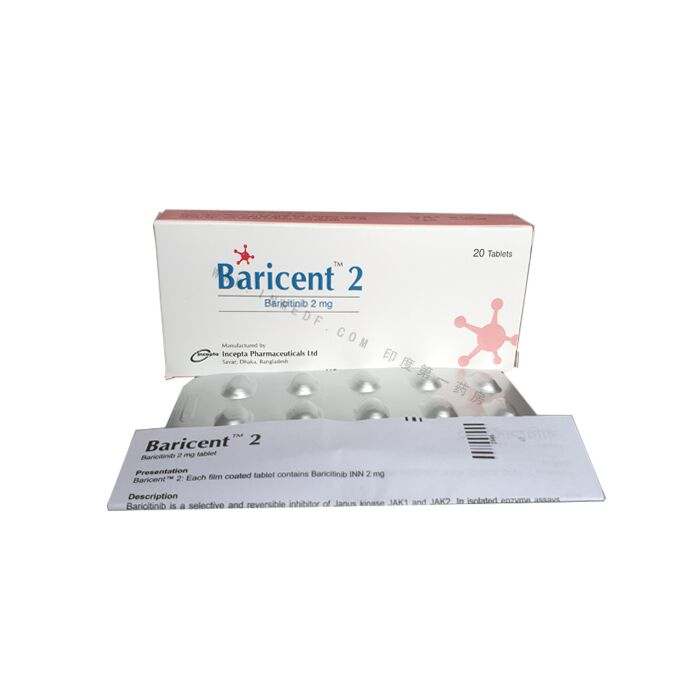
Type:20 Tablets
Generic Name:Baricitinib
Manufacturer:Incepta Pharmaceuticals Ltd.
Price:৳500.00
Rheumatoid Arthritis
Rheumatoid Arthritis Indicated for adults with moderately to severely active rheumatoid arthritis (RA) who have had an inadequate response to one or more tumor necrosis factor (TNF) antagonist therapies May be used as monotherapy or in combination with methotrexate or other nonbiologic disease-modifying antirheumatic drugs (DMARDs) 2 mg PO qDay
Janus kinases (JAKs) pathways inhibitor; JAK consists of a group of intracellular tyrosine kinases that transmit signals from cytokine or growth factor-receptor interactions on the cellular membrane to influence cellular processes of hematopoieses and immune cell function Within the signaling pathway, JAKs phosphorylate and activate signal transducers and activators of transcription (STATs), which modulate intracellular activity including gene expression; baricitinib modulates the signaling pathway at the point of JAKs, preventing the phosphorylation and activation of STATs
Serious and sometimes fatal infections may develop owing to bacterial, mycobacterial, invasive fungal, viral, or other opportunistic pathogens reported; may cause reactivation of latent TB or viral infections (see Black Box Warnings and Dosing Considerations) Consider risks and benefits before initiating in patients with chronic or recurrent infection, history of serious or opportunistic infection, underlying conditions predisposing them to infection, or patients who have been exposed to tuberculosis or have resided or traveled in areas of endemic tuberculosis or mycoses (see Black Box Warnings) Consider TB therapy for patients with a negative test for latent TB but who have risk factors for TB infection; consultation with a physician with expertise in TB recommended to aid in decision about whether initiating anti-TB therapy is appropriate If a new infection develops during treatment, promptly initiate diagnostic tests appropriate for an immunocompromised patient; if necessary, initiate appropriate antimicrobial therapy and closely monitor; interrupt baricitinib therapy if patient unresponsive to treatment If herpes zoster occurs, interrupt treatment until episode resolves Malignancies were observed in clinical studies; non-melanoma skin cancers (NMSCs) reported; periodic skin examination is recommended for patients who are at increased risk for skin cancer Perform screening for viral hepatitis in accordance with clinical guidelines before starting therapy; unknown impact on chronic viral hepatitis reactivation Increased incidence of thrombosis, including DVT and PE, observed compared with placebo; caution in patients at increased risk of thrombosis (see Black Box Warnings) Gastrointestinal perforation reported in clinical studies, although the role of JAK inhibition in these events is unknown May increase incidence of neutropenia, lymphopenia, anemia, or elevated LFTs or lipids; monitor laboratory values at baseline and periodically during treatment
>10% Upper respiratory tract infections (16.3%) 1-10% Nausea (2.7%) Increased LFTs (1-2%) Platelet elevations (1-2%) Herpes zoster infection (1%) <1% Acne (<1%) Herpes simplex infection (0.8%) Neutropenia (0.3%)
Pregnancy Data in pregnant women are insufficient to inform a drug-associated risk for major birth defects or miscarriage Animal studies In animal embryo-fetal development studies, oral baricitinib administration to pregnant rats and rabbits at exposures equal to and greater than ~20 and 84 times the maximum recommended human dose (MRHD), respectively, resulted in reduced fetal body weights, increased embryo lethality (rabbits only), and dose-related increases in skeletal malformations Lactation Unknown if distributed in human breast milk Baricitinib is present in the milk of lactating rats Owing to species-specific differences in lactation physiology, the clinical relevance of these data are not clear Because of the potential for serious adverse reactions in nursing infants, advise women not to breastfeed while taking baricitinib
Avoid use of live vaccines; update immunizations in agreement with current immunization guidelines before initiating Coadministration with strong OAT3 inhibitors may increase baricitinib systemic exposure